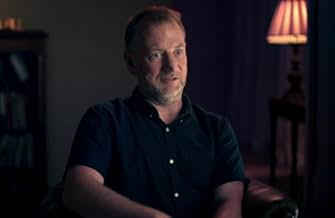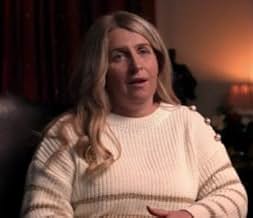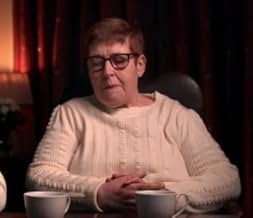Un matrimonio mortal en Carolina del Norte
Título original: A Deadly American Marriage
Una perturbadora llamada al 911 y una escena horrible rodean la muerte de Jason Corbett, mientras su familia revela recuerdos y verdades tras su vida aparentemente perfecta.Una perturbadora llamada al 911 y una escena horrible rodean la muerte de Jason Corbett, mientras su familia revela recuerdos y verdades tras su vida aparentemente perfecta.Una perturbadora llamada al 911 y una escena horrible rodean la muerte de Jason Corbett, mientras su familia revela recuerdos y verdades tras su vida aparentemente perfecta.
Jason Corbett
- Self - Murder Victim
- (material de archivo)
Opiniones destacadas
I don't even know where to start. Just look at the crime scene and the brutality of that murder. Self defense does not make you bash someone's head in that bad.
I never believed anything that Molly or Tom said, especially Molly. She is a manipulative liar and an awful person. Sitting there, with her crocodile tears, saying how she is the victim! Jason and his kids are the real victims here! And Tom was as cold as the deepest ice in Antarctica.
Why did they not question Molly's mother more? She was asleep when the murder took place and she said that she heard "something" but fell back to sleep. Considering the brutality of the murder that took place I doubt that. She probably knows more about what happened.
And then we have the audio recordings from the hidden devices that Molly placed around the house. All you could ever hear on those recordings were Molly and Jason arguing and discussing, like EVERY couple do. Not a single time did we hear Jason abusing Molly. And why did we get to hear so little from these recordings? Maybe because there was nothing more to hear, because Molly is a liar.
I feel so sorry for Jack and Sarah and I hope they get real justice one day. I can't believe these two murderers get to walk free when the evidence is so clear. Shame on the justice system.
A good documentary, but left too many questions unanswered.
I never believed anything that Molly or Tom said, especially Molly. She is a manipulative liar and an awful person. Sitting there, with her crocodile tears, saying how she is the victim! Jason and his kids are the real victims here! And Tom was as cold as the deepest ice in Antarctica.
Why did they not question Molly's mother more? She was asleep when the murder took place and she said that she heard "something" but fell back to sleep. Considering the brutality of the murder that took place I doubt that. She probably knows more about what happened.
And then we have the audio recordings from the hidden devices that Molly placed around the house. All you could ever hear on those recordings were Molly and Jason arguing and discussing, like EVERY couple do. Not a single time did we hear Jason abusing Molly. And why did we get to hear so little from these recordings? Maybe because there was nothing more to hear, because Molly is a liar.
I feel so sorry for Jack and Sarah and I hope they get real justice one day. I can't believe these two murderers get to walk free when the evidence is so clear. Shame on the justice system.
A good documentary, but left too many questions unanswered.
In A Deadly American Marriage, the crime is the spark, but the real spectacle is Molly. A woman so determined to become a mother that she adopted not just children, but also narrative - and manipulation - as extensions of motherhood. The production follows the traditional true crime formula: reenactments with dramatic music, tearful witnesses, furrowed-brow prosecutors, and that kind of editing that feels a little too edited. But while the format may be familiar, the content gains weight from something rarer: the defendants are present. Flesh, bone, and rehearsed answers. And that alone made me watch with a different level of attention.
And what a character Molly is. A sort of Amy Dunne without the literary gloss, but with a camera rolling and a microphone at the ready. If in Gone Girl fiction was the weapon, here it's home videos and secretly recorded audio - where the truth isn't revealed, it's assembled. Molly records everything. Shapes everything. And in the end, her version survives not because it's convincing, but because it's the only one with a soundtrack. It's unsettling to realize how much she controlled the narrative with meticulous calm. The documentary doesn't truly confront her - and perhaps that's both its flaw and its greatest strength. Because the discomfort comes precisely from what isn't said to her.
The direction tries to be impartial, but it's not blind. The camera knows where to focus - and the enigma lives in her eyes. There's an inevitable fascination with a woman who talks about miscarriage with the same coldness with which she denies ruining someone's life. There's no doubt the marriage was tense. But self-defense bleeds too much to support any thesis. The crime scene speaks, and it speaks loudly. She, however, walks away almost clean, accompanied by her father - a former FBI agent and both literal and emotional accomplice. A man so ready to protect her he seems more like a reputation bodyguard than a parent. Their relationship is unsettling, shrouded in a kind of protection that feels more like narrative armor.
But what truly breaks the heart are the children - orphaned of a father, kidnapped from stability, and used as pawns on an emotional chessboard. Deceived kids, forced to spin 360° on a carousel of versions and accusations. And even with so many testimonies, what weighs most is what was never said to them. It's hard not to feel pity. It's hard not to feel outraged. The narrative focuses on them at moments, but always circles back to the involuntary protagonist who never relinquishes the spotlight. They are the real victims. And in this legal drama, the courtroom is just the backdrop for a custody battle - not only for the children, but for the truth itself.
In the end, it's not so much about the crime, but about who gets the privilege of telling the story. And Molly, with all the spotlights and improvised scripts, didn't just tell it - she directed it. A deadly American marriage - or perhaps, a toxic motherhood disguised as eternal love.
And what a character Molly is. A sort of Amy Dunne without the literary gloss, but with a camera rolling and a microphone at the ready. If in Gone Girl fiction was the weapon, here it's home videos and secretly recorded audio - where the truth isn't revealed, it's assembled. Molly records everything. Shapes everything. And in the end, her version survives not because it's convincing, but because it's the only one with a soundtrack. It's unsettling to realize how much she controlled the narrative with meticulous calm. The documentary doesn't truly confront her - and perhaps that's both its flaw and its greatest strength. Because the discomfort comes precisely from what isn't said to her.
The direction tries to be impartial, but it's not blind. The camera knows where to focus - and the enigma lives in her eyes. There's an inevitable fascination with a woman who talks about miscarriage with the same coldness with which she denies ruining someone's life. There's no doubt the marriage was tense. But self-defense bleeds too much to support any thesis. The crime scene speaks, and it speaks loudly. She, however, walks away almost clean, accompanied by her father - a former FBI agent and both literal and emotional accomplice. A man so ready to protect her he seems more like a reputation bodyguard than a parent. Their relationship is unsettling, shrouded in a kind of protection that feels more like narrative armor.
But what truly breaks the heart are the children - orphaned of a father, kidnapped from stability, and used as pawns on an emotional chessboard. Deceived kids, forced to spin 360° on a carousel of versions and accusations. And even with so many testimonies, what weighs most is what was never said to them. It's hard not to feel pity. It's hard not to feel outraged. The narrative focuses on them at moments, but always circles back to the involuntary protagonist who never relinquishes the spotlight. They are the real victims. And in this legal drama, the courtroom is just the backdrop for a custody battle - not only for the children, but for the truth itself.
In the end, it's not so much about the crime, but about who gets the privilege of telling the story. And Molly, with all the spotlights and improvised scripts, didn't just tell it - she directed it. A deadly American marriage - or perhaps, a toxic motherhood disguised as eternal love.
This was a difficult watch and I feel so much for Jack and Sarah. They should feel some comfort knowing they did all they could to restore their Father's reputation and they did him proud. Quite early on, the one thing that became apparent to me was that Molly was only interested in having those children. Alarm bells are ringing, and this movie adequately supported the evidence of a manipulative, messed up girl masquerading as a stable mother figure.
In terms of the arguments about asthma death, I am an asthmatic, and I have woken in the middle of the night gasping, thinking I might die. To say it is scary is an understatement.
This is a tragic story, even more so because manipulators do not suddenly stop manipulating. It wouldn't surprise me if someone else falls victim to Molly.
In terms of the arguments about asthma death, I am an asthmatic, and I have woken in the middle of the night gasping, thinking I might die. To say it is scary is an understatement.
This is a tragic story, even more so because manipulators do not suddenly stop manipulating. It wouldn't surprise me if someone else falls victim to Molly.
"I can't tell" was what Tom Martens told the 911 operator when they asked him if Jason Corbett was still breathing. Later, he and his daughter, Molly, Jason's wife, can be heard attempting or feigning an attempt to perform CPR on Corbett's unresponsive body. Checking for signs of breathing precedes CPR. "I can't tell" implies either he didn't care to check whether Corbett was still breathing or he already knew that Corbett was dead.
Very rarely in true crime documentaries do we get to see an even portrayal of both sides of the story. No one involved had "declined to comment" and it felt very much like witnessing a live trial where cases of the defense and prosecution are being presented as we the audience watch on like a member of the jury. In this sense, this documentary succeeds in allowing you to form your own opinion about the truth surrounding the death of Jason Corbett - was he the victim or the aggressor who was killed in self-defense?
A few things stood out to me. Tom's coldness and detachment when discussing the death of his son-in-law, and his smirk that was captured at the police station. Molly's unwavering focus on herself and her image as the mother of Jack and Sarah, speaking of them as if she was their birth mother, as well as the abject absence of any remorse or horror towards her husband's death, even if he was abusive according to her. After all, she admitted to striking him in the head with a brick.
Jack and Sarah were more reliable narrators, especially when they each expressed sadness and guilt over their initial statements to the authorities at the tender ages at 9 and 7 respectively, that portrayed their father as having a temper and abusive towards Molly; these statements were later retracted when they concluded that they had been groomed by Molly. The defense attorneys homed in on medical notes that indicated Jason reporting "getting angry for no reason", while ignoring the bigger picture that Jason had hypothyroidism and hadn't been taking his medication for seven months. Symptoms of hypothyroidism include weight gain, fatigue, depression and irritability.
DARVO is Deny, Attack, Reverse Victim and Offender; Molly gave a masterclass of this here. A real victim of coercive control wouldn't dare to risk their abuser finding a recording device, let alone plant several at various locations in the home and in the car. Molly saying "I was the mother to the Jack and Sarah that existed in another lifetime" also informed me that she never truly cared for the children. She only saw them as extensions of herself as she basked in title of Mother and wanted them so that she could continue her charade. But Jason would not allow her to be their adoptive mother and wanted to return to Ireland with Jack and Sarah. That was the motive.
Very rarely in true crime documentaries do we get to see an even portrayal of both sides of the story. No one involved had "declined to comment" and it felt very much like witnessing a live trial where cases of the defense and prosecution are being presented as we the audience watch on like a member of the jury. In this sense, this documentary succeeds in allowing you to form your own opinion about the truth surrounding the death of Jason Corbett - was he the victim or the aggressor who was killed in self-defense?
A few things stood out to me. Tom's coldness and detachment when discussing the death of his son-in-law, and his smirk that was captured at the police station. Molly's unwavering focus on herself and her image as the mother of Jack and Sarah, speaking of them as if she was their birth mother, as well as the abject absence of any remorse or horror towards her husband's death, even if he was abusive according to her. After all, she admitted to striking him in the head with a brick.
Jack and Sarah were more reliable narrators, especially when they each expressed sadness and guilt over their initial statements to the authorities at the tender ages at 9 and 7 respectively, that portrayed their father as having a temper and abusive towards Molly; these statements were later retracted when they concluded that they had been groomed by Molly. The defense attorneys homed in on medical notes that indicated Jason reporting "getting angry for no reason", while ignoring the bigger picture that Jason had hypothyroidism and hadn't been taking his medication for seven months. Symptoms of hypothyroidism include weight gain, fatigue, depression and irritability.
DARVO is Deny, Attack, Reverse Victim and Offender; Molly gave a masterclass of this here. A real victim of coercive control wouldn't dare to risk their abuser finding a recording device, let alone plant several at various locations in the home and in the car. Molly saying "I was the mother to the Jack and Sarah that existed in another lifetime" also informed me that she never truly cared for the children. She only saw them as extensions of herself as she basked in title of Mother and wanted them so that she could continue her charade. But Jason would not allow her to be their adoptive mother and wanted to return to Ireland with Jack and Sarah. That was the motive.
Two very opposing versions of a married life and two kids forever damaged by what ultimately happened. The brutality of the death speaks volumes. Not self-defence. It was murder as the baseball bat blows kept going even when he was incapacitated. Molly Martens is clearly guilty and is likely a sociopath, assisted by her ex FBI doting father who deserves an oscar for his nonsense testimonies that do not make any sense. The Martens are evidently dangerous and manipulative. The courts have said so. I hope the kids are able to move on now from from the Martens poison they had to endure. What do I hope for the Martens? Nothing but relentless and swift karma. The documentary was excellent. It did portray both sides, but it showed that any bit of ambiguity (not in this case) or lack of corroboration as to how a violent event occurred could cause people to query matters. Then, instead, you have to look at the graphic crime scene evidence. Not for the faint hearted and not some attempt but somebody to subdued anyone that may have been, in any way, aggressive. This was a brutal and sustained assault in someone who could not defend themselves. If such alleged aggressor is no longer a threat, it stops there. To keep going...that's murder. No two ways about it. Full stop.
Selecciones populares
Inicia sesión para calificar y agrega a la lista de videos para obtener recomendaciones personalizadas
Detalles
- Fecha de lanzamiento
- País de origen
- Idioma
- También se conoce como
- A Deadly American Marriage
- Productora
- Ver más créditos de la compañía en IMDbPro
- Tiempo de ejecución1 hora 42 minutos
- Color
- Relación de aspecto
- 2.00 : 1
Contribuir a esta página
Sugiere una edición o agrega el contenido que falta





















